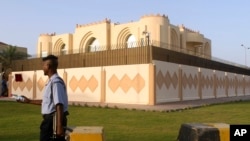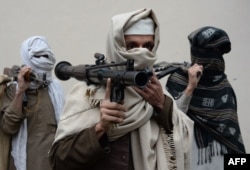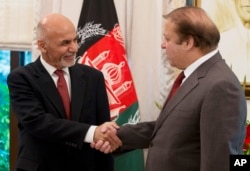Afghanistan's Taliban has demanded official recognition for its political office in Qatar, direct talks with the United States and removal of senior members from a U.N. blacklist, describing these as preliminary steps to peacefully ending its insurgency.
A Qatar-based Taliban spokesman, Sohail Shaheen, has asserted the presence of U.S.-led foreign troops in Afghanistan is the “root cause” of war and its continuation.
The “foreign occupation forces” are undermining the country’s sovereignty and freedom of its politics as well as the government, he added.
“That is why there is need for America and its allies to come to the table for direct talks with the Islamic Emirate (the Taliban) for negotiating an end to the occupation,” Shaheen said.
If peace is the objective of the other side, he asserted, then the Taliban must be allowed to open its “Political Office” in Qatar and names of its senior members be removed from the U.N. black list.
“These obstacles in the way of establishing peace cannot be simply ignored,” Shaheen said, warning that “mere slogans and statements” (by the other side) would further complicate the issue rather than promoting Afghan peace.
The U.S. State Department released a statement Friday that acknowledged American officials have seen the Taliban's statement, and appeared not to explicitly rule out the prospect of talks with the militant group.
"As we have long said, the only way to end the conflict in Afghanistan is through a peace and reconciliation process with the Taliban. We are ready to accept any political resolution of the conflict between the Afghan government and the Taliban so long as the outcome of any process ensures that the Taliban cease violence, break associations with international terrorism, and accept Afghanistan's constitution, including its protections for women and minorities," the statement said.
The Taliban maintains an unofficial political office in Doha, the capital of the Gulf state, for meetings with Afghan and foreign interlocutors.
The controversial facility was formally opened in 2013, but the move outraged the Afghan government, forcing Qatari authorities to stop the Taliban from officially using it. Afghan President Ashraf Ghani has also refused to give recognition to the Taliban’s office.
Instead, he has intensified military operations against insurgents in Afghanistan and has even recently asked for the United Nations to declare Taliban chief Mullah Hibatullah as global terrorist
The stepped up Taliban hostilities this year have allowed the insurgents to inflict heavy casualties on Afghan forces and capture more territory, diminishing hopes for any peace talks between the warring sides. Ghani's move to demand the U.N. blacklist the Taliban leader deals another blow, says Michael Kugelman of the Woodrow Wilson Center in Washington.
“If Kabul is willing to so bluntly reject the Taliban’s preconditions for talks, then it’s effectively sent a signal that talks are off the table for the foreseeable future,” Kugelman told VOA.
President Ghani has also been harshly critical of neighboring Pakistan for not uprooting alleged Taliban sanctuaries on its soil he says are prolonging the war and bloodshed in his country.
Islamabad denies the charges.
Taliban spokesman Zabihullah Mujahid, however, claims its leaders have been guiding the insurgency from within Afghanistan. Speaking to VOA, he asserted that "any institutions" established to serve Afghan refugees in Pakistan have recently been relocated to mainly southern Afghan provinces, including Helmand, where most districts are controlled by insurgents.
But Afghan officials dismiss the assertions and insist Pakistani authorities continue to harbor Taliban insurgents.
“We reject recent claims by the Taliban that the group’s leadership council has relocated to southern Helmand province from Pakistan,” Afghan Foreign Minister Salahuddin Rabbani told NATO foreign ministers’ meeting Wednesday in Brussels.
“Such claims have no merit and are aimed at diverting attention from a lack of sincere effort by some to combat terrorism effectively, and in good faith,” Rabanni said in a veiled reference to Pakistan.
Pakistan’s foreign ministry spokesman, Nafees Zakaria, on Thursday again rejected the Afghan allegations as “regrettable”.
“Pakistan has been doing everything for taking action against terrorist and militant groups for not allowing to use our soil. This is a matter of fact. Afghan government should engage with Pakistan in counterterrorism cooperation and border management instead of blaming Pakistan for all its problems in Afghanistan.”
Zakaria went on assert that anti-Pakistan militant groups are using Afghan soil for attacks inside Pakistan and called for Kabul to take action against them.






